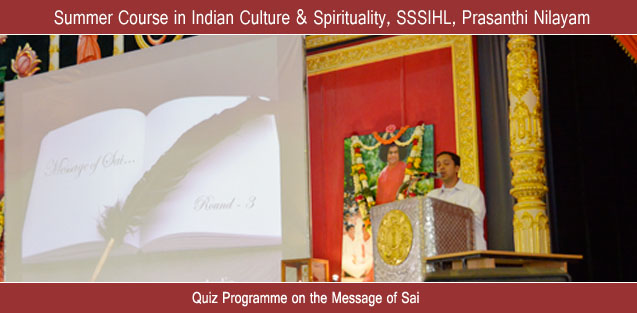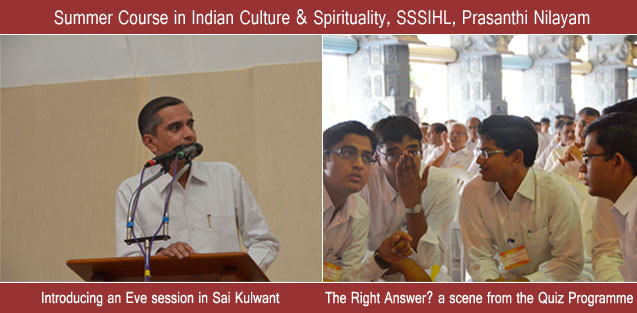Summer Course in Indian Culture and Spirituality, A Report – Day 2
Sunday, July 10th, 2011
DAY 2 (11th June 2011):
The first speaker, Prof. G. Venkataraman, eminent scientist, and former Vice Chancellor of Sai University, and the Director of Radio Sai spoke on the topic, “Relevance of Sai Education Philosophy in Contemporary World”..
Combining effortlessly and sensitively his reminiscences of Bhagawan Sri Sathya Sai Baba with his own experiences of the secular world, and citing cogently from Sai Discourses, he elucidated on the topic. To believe, as some do, that there is no connection between spirituality and society is a big mistake. Before we discharge our duty to the world around us we must realize the universality of the Divine.
In order to carry out our duties, we must develop two qualities in ourselves: sensitivity and Integrity. Sensitivity is compassion; and we will be able to carry out this task when we keep in mind the possibility that today’s rich can become tomorrow’s poor. And sensitivity is needed in our dealing with the world at every level.
Integrity is absolute honesty; it also translates into steadfastness. It is practised in daily life in our one-to-one dealings or one-to-many dealings. For example, in business, Sai has exhorted us to keep in mind that ‘Customer is God.’ The evil we do will rebound on us.
We must look for God within—see the same God in everyone around you. Then we can never hurt others. Spirituality and our social obligations go together. Character and integrity are synonymous. Development of individual character leads to burgeoning of national character.

The second speaker was Prof. Viswanath Pandit, eminent economist, and former Vice Chancellor of Sri Sathya Sai Institute of Higher Learning. He spoke on ‘Role of Values and Ethics in Education.’
He reiterated Sai’s objective in establishing the University that SSSIHL must produce role models. He defined Education as the process which brings out the inherent divinity in each of us. Thus, Education is Educare.
Today, however, everywhere in the world outside, education has become a business; and education has become synonymous with the development of mere skills. Virtue and wisdom are replaced by folly and worse. Quoting from Swami Ranganathananda’s wry prescription of the Eleventh Command for the modern man—‘after violating the Ten Commandments, make sure you escape from the hands of law’.
The learned scholar traced the ills of the modern world to the failure of its education system. The recent recession in the West is a direct consequence; as well as the nexus between the government and the corporate world and rampant consumerism; Prof. Pandit quoted statistics to show how all this has resulted in unprecedented inequalities among the upper classes and the poorer classes. The rich have become richer, the poor poorer.
The only way out is Sai’s prescription: practise ‘Ceiling on Desires.’ Quoting from the Yajurveda, Prof. Pandit stressed on the urgent need expand the concept of Ethics to Dharma; and take Dharma to the level of Sathya—God. He mentioned that the so-called Rationality and Reason have only resulted in selfishness and happiness is not related to economic success. There is a need to develop a ‘binocular’ vision—secular as well as spiritual awareness. Sai’s Golden Triangle of God, Man and Society must be our goal, the goal of education. Skill formation must go with development of spirituality.
The speech was followed by the second part of the video, ‘Living with God is True Education’.
The third speaker of the morning’s programme Sri K. Chakravarti, the first Registrar of the University and for the secretary of the Sri Sathya Sai Central Trust, delivered an erudite talk on ‘Innovation in the Head, Passion in the Belly and Compassion in the Heart ’:
Quoting from a wide range of poets and writers, the learned speaker focused on the need for compassion; and the training of the minds of students. As someone closely following all Sai’s programmes and especially the progress of the Sai University, Sri Chakravarti expressed satisfaction that Sai students are among the top 1% of the country. Even the quality our research is better than the national average.
However, there is need to improve, and how do we do it? The learned speaker has a complete prescription: learn to learn. In other words, the teachers of SSSIHL must teach their students on how to learn. Classroom learning should inspire students to read the classics from their respective fields. The extracts in textbooks will be understood more in context only when the entire original text is studied, he emphasised. Even for relaxation, instead of fiction, students should resort to poetry since it is not only relaxing but also elevating.
Sai students, Sri Chakravarti emphasized, must practise Swami’s ideals: especially sharing and caring: sharing with others what we have and caring for others with a sense of equality and compassion. Thus a Sai student must foster his or her higher self. Above all the value to nurture and practise is compassion, mercy. Let the noble and sublime side of our personality play its role. A responsive heart is what matters. At the same time Sai students and teachers must aim at pushing the frontiers of knowledge.

Sri V. Srinivasan, the All India President of Sri Sathya Sai Seva Organization, was the fourth speaker of the morning and he spoke on “Guidelines for the Institute“. He recalled Bhagavan’s definitive statement: ‘I am God, you are also God, and the difference is that I know it and you don’t.’ He went on to allude to the various festivals celebrated in Prasanthi Nilayam, attended by thousands of devotees from all over the world, all brought here by Swami’s love acting as a Divine Magnet.
Sri Srinivasan went on to elucidate the guidelines laid by Swami for the University.
The first is, “Service to Society, where service to society is service to God”.
The second is, “Cultivate love in your heart because only when you cultivate love in your heart you begin your journey Godwards”.
The third is, “Truth is 3-H—harmony between head, heart and hands: thought, word and deed”.
He recalled a meeting with Swami: when Swami asked them what the meaning of Swaraj is; they all said ‘complete freedom’. Then Swami commented that no one in the universe has attained complete Swaraj only He, God, has because he alone enjoys Free Will.
Another guideline emphasizes that our mind should pursue not just information, but wisdom. Here he alludes to an episode from Ramakrishna’s life: when the Paramhamsa said that in order to attain God you should pine for him. He added that, true freedom is self-regulation. This ought to be the goal of every Sai student. He concluded by quoting Swami, “I give you what you want, in the hope that one day you will ask me what I have come to give you.’

Before the last speech there was an interesting Quiz based on the life and message of Bhagavan Baba, where teams from all the campuses participated enthusiastically. The quiz master, Sri Shashank Shah, a post doctoral fellow in Management, admirably brought the entire life and mission of the Avatar of the Age in front of the audience through insightful questions and slideshows of rare photographs bringing the moments to life. Even elders enthusiastically participated in the event answering questions passed by the participating students. Fittingly, the quiz ended in a tie with all three teams scoring exactly 80 points.
After the lunch break, the campuses met separately for further discussion on the selected discourses by Bhagavan Baba on Indian Culture and Spirituality, with the teachers acting as facilitators. These discussions prodded the students to introspect on the finer aspects of a spiritual life in harmony with the rich Indian heritage. Select Representatives from the groups presented the learnings.

Students assembled in the Sai Kulwant Hall by 04:30 pm. After Vedam Chanting, there was a summary presentation by students after which, there was a music programme by the students of Ananatpur campus of the University.
After Dinner, the three campuses met seperately and continued the much sought after Satsanga talking about individual experiences with Bhagawan.
Tags: Conferences, Functions, Photos, Student Programmes
Posted in Reports |


